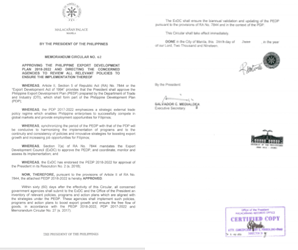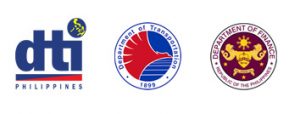 In a Presidential Memorandum Circular (MC) No. 62 approving the Philippine Export Development Plan (PEDP) 2018-2022, concerned government agencies are mandated to implement their respective programs, activities and projects (PAPs) relevant to the PEDP.
In a Presidential Memorandum Circular (MC) No. 62 approving the Philippine Export Development Plan (PEDP) 2018-2022, concerned government agencies are mandated to implement their respective programs, activities and projects (PAPs) relevant to the PEDP.
Specifically, these agencies “shall implement policies, programs, and action plans to boost export growth and ensure the free flow of goods, in accordance with the Philippine Export Development Plan and Philippine Development Plan (PDP)”.
The “PEDP is synchronized with the period of PDP to harmonize the implementation of programs and to the continuity and consistency of policies and innovative strategies for boosting export growth and increasing job opportunities for Filipinos”.
The Department of Trade, Foreign Affairs, Agriculture, Energy, Environment and Natural Resources, Health, Finance, Information and Communication Technology, Interior and Local Government, Public Works and Highways, Transportation, Tourism, Labor and Employment, Tourism, TESDA, CHED, BSP and NEDA are among the agencies mandated to strengthen the implementation of the Plan.
On 26 June 2019, President Rodrigo Roa Duterte signed the MC No. 62 approving the PEDP 2018-2022 and directing the foregoing agencies to ensure its implementation. PKC

 In a recent pronouncement, DTI Secretary Ramon Lopez stated that the Departments of Trade and Industry, Transportation and Finance will issue the Joint Administrative Order (JAO) that will regulate local charges imposed by international shipping lines.
In a recent pronouncement, DTI Secretary Ramon Lopez stated that the Departments of Trade and Industry, Transportation and Finance will issue the Joint Administrative Order (JAO) that will regulate local charges imposed by international shipping lines.